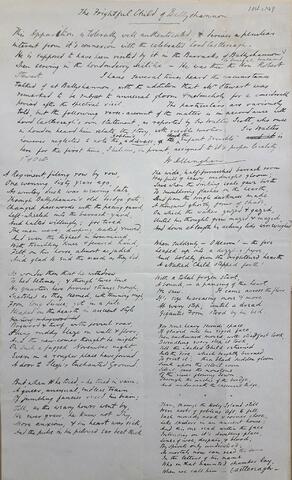Cote
Titre
Date(s)
- 1 Oct. 1849 (Création/Production)
Niveau de description
Étendue matérielle et support
1 p.; manuscript
Nom du producteur
Histoire archivistique
Source immédiate d'acquisition ou de transfert
Portée et contenu
A poem by William Allingham titled ‘The Frightful Child of Ballyshannon’ and dated 1 October 1849. As noted in Allingham’s introduction, the poem refers to a story that a ghostly apparition (taking the form of a child) haunted Robert Stewart, better known as Lord Castlereagh (1769-1822), a leading Anglo-Irish statesman and politician, probably best remembered for his role in suppressing the 1798 Rebellion and in securing the passage of the Act of Union in 1800.
The verse recounts a local tradition that Stewart was visited by the spectre while inspecting a military barracks in Ballyshannon in County Donegal. Allingham suggests that Stewart was subject to an ‘unusual gloom and melancholy for a period after the spectral visit’. Stewart was known to be susceptible to paranoia and later severe mental health problems. It is likely that Allingham’s poem was also influenced by the fact that Stewart was a widely reviled figure in Ireland.
The last stanza of Allingham’s poem reads:
Then, through the Holy Island still
Were nests of goblins left, to fill
Each mouldy nook & corner close,
Like spiders in an ancient house:
And this one read within the face
Intruding on it’s dwelling-place,
Lines of woe, despair, & blood;
By Spirits only understood;
As mortals now can read the same
In the letters of his name
Who in that haunted chamber lay,
When we call him — Castlereagh.
Évaluation, élimination et calendrier de conservation
Accroissements
Mode de classement
Conditions d'accès
Conditions de reproduction
Langue des documents
Écriture des documents
Notes de langue et graphie
Caractéristiques matérielle et contraintes techniques
Instruments de recherche
Existence et lieu de conservation des originaux
Existence et lieu de conservation des copies
Unités de description associées
Note
For biographical information on William Allingham (1824-1889) see https://www.dib.ie/biography/allingham-william-a0122

